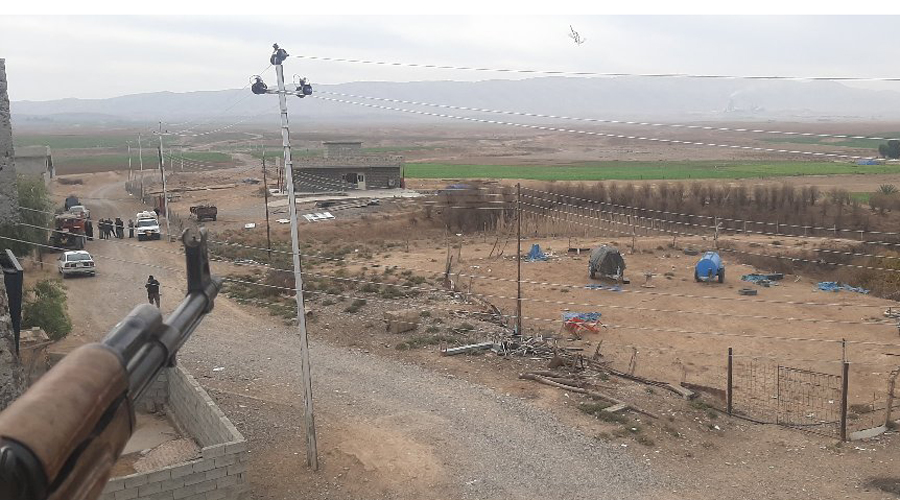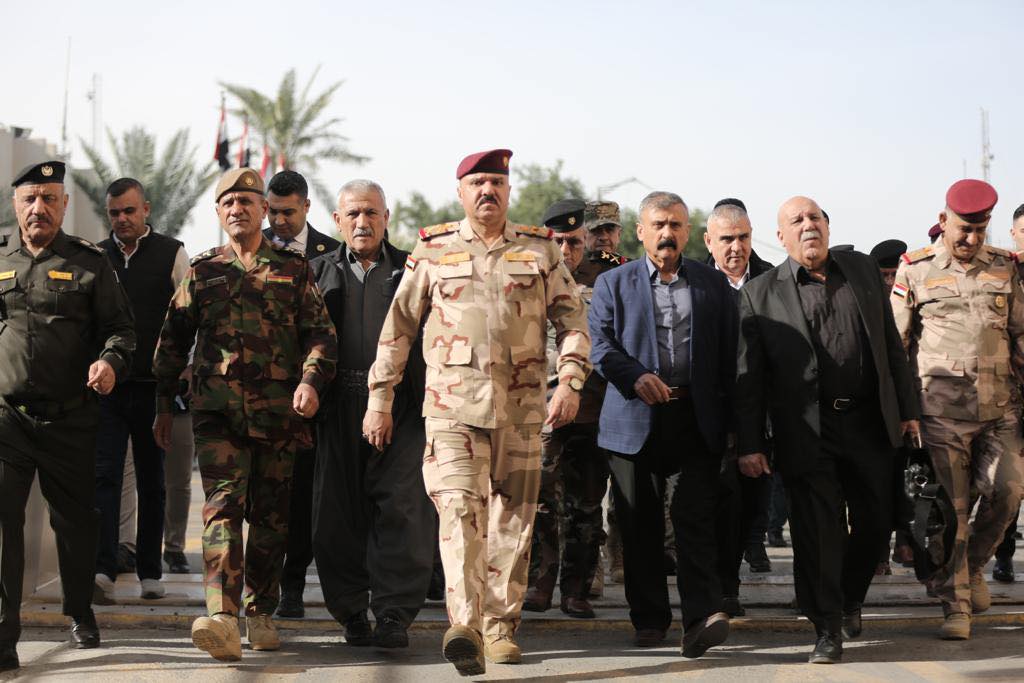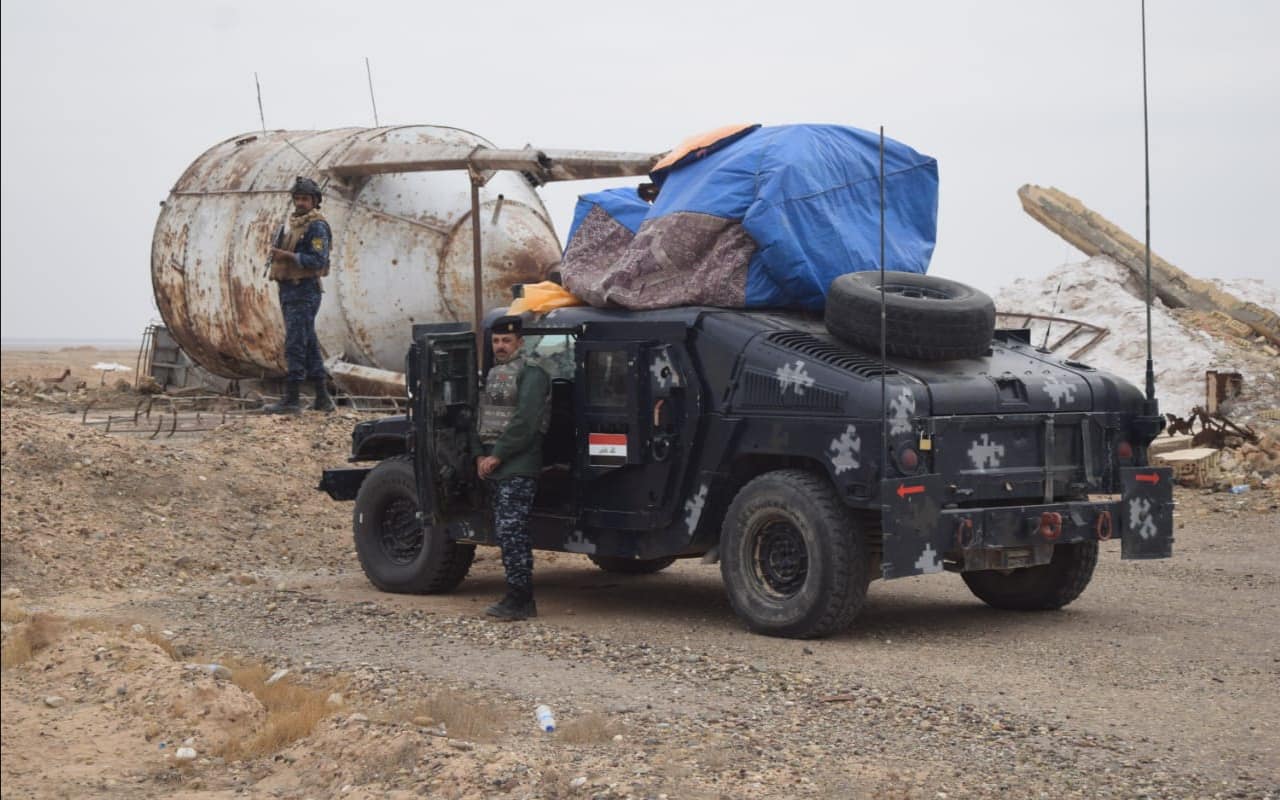Two joint brigades of the Iraqi army and the Kurdish Peshmerga are undergoing training separately in Baghdad and Erbil in order to form two joint brigades tasked to secure hundreds of kilometers of security gap ranges from Khanaqin on the border with Iran via Kirkuk up to SIhela on the borders with Syria.
The efforts are intensified lately following tens of attacks by the regrouping militants of the Islamic State in Iraq and Levant ISIL targeted the Peshmerga forces in Diyala, Kirkuk and Ninewa borderlines.
In nine days, November 27th up to December 5th, 22 Peshmerga members and civilians were killed in the deserted regions between the Peshmerga and the Iraqi military and security forces by attacks of ISIL militants.
The last attack was on December 5th when 4 peshmerga were killed, including an officer and two were injured by attack of "Daesh terrorist gangs" targeted Peshmerga in the village of Qara Salim in Altun Kupri (Pirdy in Kurdish) northwest of Kirkuk, secretary general of KRG ministry of Peshmerga told semi-official Iraqi News Agency INA.
Sleeper cells and resistant pockets of ISIL militants are regrouping in the rural areas of the disputed territories between Baghdad and Erbil. They are posing a high threat by different tactics such as hit-and-run attacks, kidnappings, IEDs and roadside bombs targeting the Iraqi forces and civilians.
The persistence of ISIS threats comes despite the fact that the former Iraqi Prime Minister Haider al-Abadi announced in late 2017, the complete elimination of ISIS in Iraq, after nearly three years of military confrontations.

Kirkuk, December 5th 2021: Residents of the village of Liheban of Sargaran sub-district on alert to repel the attacks of ISIL militants, before evacuating it. Kirkuk Now
The teams of Iraqi ministry of defense and Ministry of Peshemrga MOP under the Kurdistan Regional Government KRG are negotiating over months to form two joint brigades to fill in the security gap in the disputed territories.
General Jabar Yawarmanda, secretary general of MOP, said there is a mutual understanding not signed agreement to form these two brigades “supposed to be in force last July but it was delayed to some logistic and financial points.”
Gen. Yawarmanda said the brigade of the MOP is under training the same as the Iraqi army and they will be mixed into joint forces in December in order to be deployed in the disputed territories in January.
Regarding points of deployment, the secretary general of MOP said this will be based on surveys about points where ISIL militants are active lately.
On December 5th, residents of Liheban, a village located in Kirkuk-Erbil-Ninewa triangle, evacuated their homes due to the continued threats posed by ISIL militants who raided the village three times at night in a week. The villagers confronted them, amid reports that some of the ISIL militants have infiltrated the village late at night.
The village of Lehiban of Sargaran sub-district northwest of Kirkuk used to be home for 70 families. It is located near Mount Qarachukh, next to Makhmur district and its inhabitants are Kurds.
About 70 families used to live in the village yet following the events of October 16, 2017, and the return of the Iraqi forces to the disputed territories including Kirkuk families residing in the village has dropped to only to 20 families. On December 5th, the last family left their home, uncertain whether they will return.
The evacuation of the village of its residents came after a series of attacks launched by ISIL militants on the village and the Peshmerga positions at the foot of Mount Qarachukh on December 2, which resulted in the killing of 13 people, including three civilian brothers from the village of Khidir Jija in Makhmur district, and ten members of the Peshmerga.
Mount Qarachukh range, east of Makhmur district and southeast of Ninewa province, is a relatively harsh area, served as hideout for ISIL militants. It also represents a buffer zone between the locations of the Iraqi forces and the Peshmerga.

Baghdad, December 4th 2021: Delegation of MOP met Iraqi commanders in Baghdad to discuss the security concerns of the disputed territories. Joint Operations’ Command
Security Media Cell said on Monday that unit 14 of Iraqi army and the Peshmerga in region five of Kirkuk-Erbil safeguarded the village of Liheban and the return of its residents.
General Abdul Khaliq Talat, representative of the KRG in Iraqi joint operations’ command, told KirkukNow said MOP and Iraqi army have agreed on August 12th to form two brigades. “Positive steps have been taken in this regard and training of the forces is a sign that the agreement is being implemented.”
“Some technical and military affairs to be dealt with, otherwise even payroll list has been sent to ministry of finance,” Talat added.
The Iraqi government has decided to fund the brigades and international coalition to arm it.
Khanaqin to Sihela can’t be secured by two brigades but success of this step paves road for formation of more brigades
The figures about ISIL attacks by the ministry of Peshmerga MOP under the Iraqi Kurdistan Regional Government KRG show they have carried out 2412 attacks in the last four years since 2018.
Lieutenant general Jabar Yawar, secretary general of the MOP, told voice of America VOA Kurdish service Mid-November, "We have not agreed with Baghdad when it has declared end of Daesh in 2017 since it has led 2412 attacks up to last October. About 1742 attacks were carried out in 2018, 270 in 2019, 230 in 2020, 170 in 2021 up to end of October."
“As first stage, 2,000 soldiers and Peshemrga will be deployed in areas per orders of joint operations command. In one brigade, if the commander will be a Kurd, deputy will be a Kurds and the other brigade will be the opposite,” Gen. Talat added.
“The issue is greater than only two brigades. Khanaqin to Sihela can’t be secured by two brigades but success of this step paves road for formation of more brigades.”
The Iraqi and Kurdish forces have agreed in May to form joint cooperation centers in Baghdad, Erbil, Kirkuk, Diyala and Ninewa to share intelligence and military information and data.
Following the emergence of ISIL, Kurdish forces controlled the disputed territories up to October 2017 when Iraqi forces retook control of those areas following the war against ISIL.
Kirkuk, 2020: A military operation by the Peshmerga forces in the Sheikh Bizeni area of Shiwan district, northwest of Kirkuk. Karwan Al-Salihi
The Iraqi commanders declared they have agreed with the MOP to launch joint operations against ISIL militants.
Lieutenant General Abdul-Amir Al-Shimmari, deputy commander of joint operations’ command, following a joint meeting with the Kurdish commanders, said on December 4th they have agreed with the Peshmerga on large operations in the security gap between the federal government and KRG and further cooperation on the ground and airstrikes against ISIL hideouts.
“In the areas of joint concerns, there are problems which requires immediate and quick field cooperation. We have decided to authorize both sides for more intelligence and operation cooperation along the borders of our forces.” Lt. Gen Al-Shimmari added.
The “security gap” starts from Khanaqin, on the border with Iran, in Diyala province in the east up to Sihela on the borders with Syria on the west, about 560 kilometers long area.

Kirkuk, December 2021- Military operation north of Kirkuk. Security media cell.
ISIL militants stormed the village of Khidir Jija and the Peshmerga positions at the foot of Mount Qarachukh on December 2, which resulted in the killing of 13 people, including three civilian brothers and ten members of the Peshmerga.
Makhmur district, 60 kilometers southwest of Erbil yet under control of Iraqi federal government, consists of three sub-districts and 40 villages yet only four villages are currently inhabited, figures from local administrations show.
The Mountains of Qarachukh, adjacent to Makhmur, are located in the triangle of Erbil-Ninawa-Kirkuk, an area swept tens of times by military operation by the Iraqi and Kurdish forces yet they could not eliminate IS hideouts there.
Gen. Yawarmanda believes that political conflict has affected the formation of the joint brigades.
“Those areas are already disputed so some Iraqi parties think the KRG wants to send back its troops to those areas while our goal is not political and want to eliminate Deash militants.
Arab and Turkmen political parties and communities in Kirkuk rejected the return of the Peshmerga to disputed territories and the idea of joint forces as they insist the security of the area is to be tasked to federal troops only.






